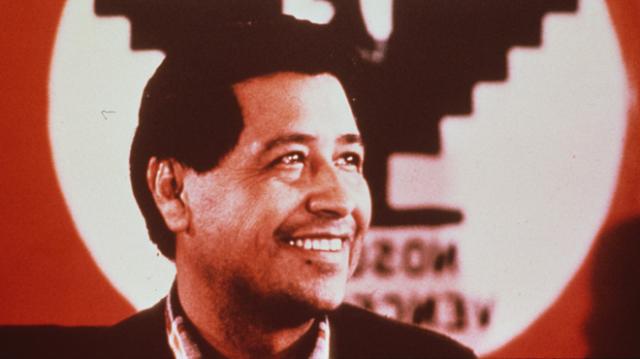Cesar Chavez is a very famous Mexican-American labor leader. He inspired many agricultural workers to stand up and face problems in the work force. Chavez led a series of peaceful protests and strikes to help migrant workers get higher pay, and started a labor movement. The actions that Cesar Chavez took called for national attention. With his relentless attitude, he led many Mexican-Americans to speak up, and to stand up for themselves and the rights that they deserved.
Cesar Chavez was born on March 31, 1927 in North Gila Valley, Arizona. At the age of 10, Chavez’s family had lost their family farm and small grocery store due to the chaos of the Great Depression. Without their farm and family-owned grocery store Chavez’s family had no financial income and were forced to join the migrant farm workers.1 When Cesar was fourteen, his father was in an automobile accident that impeded him from working, so Cesar Chavez felt the need to help his family by working in the fields and postponing his high school education for two years.2 Of course the two years became long forgotten because by the age of 17 Cesar Chavez had enlisted in the U.S. Navy. Chavez served in the Navy for two years before being discharged. Chávez described these two years as the worst years of his life.

Neither his mother nor his father wanted him to enlist in the Navy, but he knew he either had to enlist or get drafted. Instead of being drafted into the Army, he enlisted in the U.S. Navy. His work in the Navy consisted of being a deck hand and crew transport. Chavez was never engaged in combat throughout his two years of service. In a seventy-two-hour pass that Chavez and his navy friends received, they returned to Texas and attended a movie theater. Movie theaters were segregated at that time and “it was just accepted by the Mexicans” that they were to sit “in the quarter-section on the right [of the theater].”3 Chavez felt that he should not have to accept such discrimination, so he sat on the left of the theater. A scandal erupted. Chavez was asked to move back to the right of the theater and when he refused, he was sent to jail. Chavez recalls that the sergeant did not know what to charge him with and started to make phone calls to help him figure out what charges to put on Chavez. Chavez could hear the conversations about charging him with “disturbing the peace” and “being drunk.” After about an hour of deliberation with judges, chief of police, and his fellow police officers, the sergeant lectured Chavez and let him go, but not before threatening to put him in jail for life. This was the first time that Chavez had challenged rules discriminating against him due to his race, but it surely would not be the last.4
When his two years of service up, Chavez returned to work in the fields once again and in 1948 he married Helen Fabela.5 It was shortly after this that Cesar created his credit union with Dolores Huerta, a fellow worker at the Community Service Organization (CSO) that continuously encouraged him to organize farmworkers in order to help them. They would loan money out and help people of all ethnicities.

Since hundreds of people would show up to Chavez’s house because of his credit union, many of the anglos in the area started accusing them, Huerta and Chavez, of being communists, trying to bring an end to the union. Policemen would come in and try to disperse those attending, but Chavez knew the law and knew that they would not be able to put the union down.6 Cesar Chavez and all of those associated with him began being called communists. It was all over the newspapers, and back then the newspaper had a lot of influence on the community. Because of this label, people began disassociating themselves with Chavez due to fear.7
About three years after the start of the credit union, Chavez began his famous strikes, boycotts, and his 25 day fast. Chavez knew he was in for a long ride when he decided to start helping his fellow farm workers. There would be many moments of despair and even more times of joy and excitement.
- Salem Press Biographical Encyclopedia, s.v. “César Chávez,” by Cecilia M. Garcia. ↵
- Jacques E. Levy and Cesar Chavez, Cesar Chavez : Autobiography of La Causa (New York : Norton, 1975.), 73. ↵
- Levy and Chavez, Cesar Chavez : Autobiography of La Causa, 84-85. ↵
- Levy and Chavez, Cesar Chavez : Autobiography of La Causa, 84-85. ↵
- Salem Press Biographical Encyclopedia, s.v.“César Chávez,” by Cecilia M. Garcia. ↵
- Cesar Chavez, directed by Diego Luna (Santa Monica, CA : Lionsgate, 2014), DVD. ↵
- Levy and Chavez, Cesar Chavez : Autobiography of La Causa, 107. ↵



48 comments
Michael Thomas
I found this article interesting because of how it details the life of Cesar Chavez. I remember hearing about Cesar Chavez’s strikes in one of my history courses in high school. Some people called him a communist because of his belief of equality and the Red Scare, which was the fear of the spread of communism. Overall, this article was good.
Hanadi Sonouper
Having a half Hispanic background myself, it was interesting to read an article about Caesar Chavez, it was very informative yet concise. The author did a great job at presenting the information and illustrating the highlights of agriculture workers. It is not an easy job, but when you are in need of supporting a family, acquiring any job despite its low pay was essential during this time. He was able to inspire many workers to fight for better pay, creating a movement of workers to protest their rights. It was also interesting to read that he enlisted himself in the navy, that was an interesting fact that I was not aware about. However, because of his movement, and further activists to come, he paved the way for a better rights in the Mexican-American labor laws.
Anna Guaderrama
I’ve always looked up to Cesar Chavez as a role model. I always find it shocking when people ask me who he was because they’ve never heard of him. Although I never knew this much in detail over his personal life, it was interesting to see the person he was and not just the influential civil rights leader. Behind the overall story he’s most famous for, I never knew he was in the navy.
Michelle Falcon
Cesar Chavez was an inspiration to many people, especially on the Mexican American workforce. He stood up for what he believed in, whether that have been about discrimination on his race of to help farm workers to receive the help they needed. Chavez went through many difficulties he was still able to carry on. This was a very good article that I thought told his story very well.
Joshua Breard
Cesar Chavez is one of the most influential people to ever walk this earth. I know majority of his story but not the smaller micro stories about how he was arrested similarly to Rosa Parks where he would not sit in the assigned seating in a movie theater. Regardless of this arrest, he continued to be an influential civil rights leads to the Mexican-Americans with a Si Se Puede attitude! Great article on a great man!
Maria Callejas
Amazing article! I knew little about Cesar Chavez, only that Robert Kennedy supported his cause. But because of your great information/sources, I know what his cause was, so thank you! For sure he is the Martin Luther King of Mexican-Americans, showing that fearless character, standing up for justice in a time where silence was the only accepted response. Change is only brought when people are willing to go above and beyond, and that is exactly what Chavez did. Great informative article!
Brianda Gomez
This article was very well written and informative. I enjoyed learning about Cesar Chavez and how he changed the world. Chavez was a labor leader that protested for migrant rights. Low wages and unfairness in the workplace were just some of the things he wanted to fix. Chavez was an inspiration to many Mexicans because he stood up for what he believed in. Just like MLK, Chavez was not going to keep quiet. He was going to defend his people at all costs.
Alejandra Mendez
As a Hispanic of Mexican decent I grew up knowing of Cesar Chavez and his famous strikes to express what he thought was unfair. This is what most people think of when they hear his name, but not many people know the information about him provided by this article. For instance, I never knew of him being in the Navy for 2 years of his life. It is also very admiring and motivational to know that because of him and his constant efforts and stubbornness, Mexican-American workers are able to have rights to this day. A lot that is happening now in regards to labor laws, could have probably not have been possible without him.
Ernie Sano
Many Mexican-Americans look up to Cesar Chavez as a form of inspiration. The ethnical connection allows for those who fall into the category of Chicano or Latino to quickly relate to the civil rights leader, but the idea that this direct relation is grounds to say that one can interpret this any better than another is preposterous. I believe that actions of this individual live up to the standard of outstanding human characteristics that all can look up to. His actions not only served a single demographic of individuals, but added to the numerous examples in history of the ability to effectively lead and overcome barriers.
Valeria Hernandez
Aylin Salinas writes a descriptive article on the life of a Mexican American leader who represented and protested for the right of Mexican workers. Cesar Chavez is often compared to the prominent leader Martin Luther King Jr. Salinas does a fabulous job at expressive the early life of Chavez. His rise to leadership, his innate instinct of defending and protecting the rights of others and his. His life mission was to help the misfortune and misrepresented.